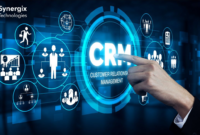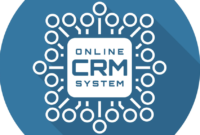Enterprise CRM System: Unlocking the Full Potential of Customer Relationship Management
Executive Summary
In the rapidly evolving business landscape, customer relationships are the cornerstone of sustainable growth. Enterprise Customer Relationship Management (CRM) systems have emerged as a transformative solution, enabling organizations to centralize, analyze, and leverage customer data effectively. This whitepaper explores the intricacies of enterprise CRM systems, their significance, implementation strategies, challenges, and the future landscape of this technology.
By understanding the potential of an enterprise CRM system, businesses can harness customer insights, improve operational efficiency, and achieve a competitive edge.
Introduction
The Importance of CRM Systems
Customer expectations are at an all-time high, and businesses must adopt technologies that offer personalized and seamless customer experiences. CRM systems facilitate this by acting as a central hub for customer interactions, providing insights that drive informed decision-making. For enterprises managing vast customer bases, the scalability and functionality of enterprise-grade CRM systems are indispensable.
Objective of the Whitepaper
This whitepaper aims to provide an in-depth understanding of enterprise CRM systems, outlining their features, benefits, and implementation strategies. It also delves into common pitfalls and best practices, offering a comprehensive guide for decision-makers.
What Is an Enterprise CRM System?
Definition
An Enterprise CRM system is a software platform designed to manage a company’s interactions with current and potential customers at scale. Unlike standard CRM systems, enterprise-grade solutions are equipped to handle the complexities of large organizations, integrating with other business tools and accommodating a vast amount of customer data.
Key Features
- Scalability: Designed to support growing customer bases and data volumes.
- Integration: Seamlessly connects with other enterprise tools like ERP and marketing automation platforms.
- Customization: Offers tailored solutions to meet industry-specific needs.
- Advanced Analytics: Provides deep insights through predictive analytics and AI.
- Security: Implements robust measures to protect sensitive customer information.
The Evolution of CRM Systems
CRM systems have evolved from basic contact management tools into sophisticated platforms that integrate AI, IoT, and machine learning. Modern CRM systems are cloud-based, offering accessibility and real-time updates that were once unimaginable.
Benefits of Implementing an Enterprise CRM System
Enhanced Customer Experience
Enterprise CRM systems enable businesses to provide personalized customer interactions by leveraging data analytics. This improves customer satisfaction and fosters loyalty.
Operational Efficiency
By automating routine tasks, CRM systems free up employees to focus on strategic activities. Workflow automation reduces errors and ensures consistency across operations.
Data-Driven Decision Making
With access to comprehensive customer data, businesses can identify trends, forecast demand, and develop strategies that align with customer needs.
Increased Revenue
Improved customer engagement and streamlined processes translate to higher sales conversions and retention rates.
Collaboration Across Departments
CRM systems act as a unified platform, facilitating communication and collaboration between sales, marketing, and customer support teams.
Implementation of Enterprise CRM Systems
Steps to Successful Implementation
- Needs Assessment: Understand organizational requirements and goals.
- Vendor Selection: Choose a CRM provider that aligns with business needs.
- Customization: Configure the system to meet specific requirements.
- Training: Educate employees to maximize system utilization.
- Integration: Ensure seamless connectivity with existing tools.
- Testing: Conduct thorough testing to address potential issues.
- Deployment: Roll out the system in phases for smoother adoption.
Challenges and Solutions
- Data Migration: Ensure accurate transfer of existing data into the CRM.
- User Resistance: Foster buy-in through training and highlighting benefits.
- Integration Issues: Work closely with IT teams to address compatibility concerns.
- Cost Management: Monitor expenditures to prevent budget overruns.
Use Cases and Industry Applications
Retail
Enterprise CRM systems help retailers analyze customer buying patterns, personalize marketing efforts, and manage loyalty programs effectively.
Healthcare
Healthcare providers use CRM systems to streamline patient management, enhance communication, and ensure compliance with regulations.
Financial Services
Banks and insurance companies leverage CRM tools to improve client relationships, manage portfolios, and mitigate risks.
Manufacturing
CRM systems assist manufacturers in managing supplier relationships, tracking inventory, and optimizing supply chains.
Hospitality
Hotels and travel companies use CRM platforms to enhance guest experiences, manage bookings, and promote targeted offers.
The Role of Technology in Enterprise CRM Systems
Artificial Intelligence (AI)
AI enhances CRM capabilities through predictive analytics, sentiment analysis, and chatbots, enabling proactive customer service.
Cloud Computing
Cloud-based CRM systems offer scalability, flexibility, and real-time data access, making them ideal for global enterprises.
Mobile CRM
Mobile applications ensure that sales and support teams have access to customer data anytime, anywhere.
Internet of Things (IoT)
IoT integration allows businesses to collect data from connected devices, offering insights into customer behavior and preferences.
Future Trends in Enterprise CRM Systems
Hyper-Personalization
The future of CRM lies in delivering hyper-personalized experiences through advanced analytics and AI.
Integration with Emerging Technologies
Technologies like blockchain and augmented reality are set to further enhance CRM capabilities.
Focus on Sustainability
CRM systems will increasingly support eco-friendly practices, helping businesses achieve sustainability goals.
Enhanced Security Measures
As data breaches become more prevalent, CRM systems will adopt advanced encryption and security protocols.
Best Practices for Maximizing ROI
Align CRM Goals with Business Objectives
Ensure that CRM implementation supports broader organizational goals.
Prioritize User Training
Invest in comprehensive training programs to encourage system adoption.
Monitor Key Metrics
Track metrics such as customer satisfaction, sales growth, and system utilization to gauge success.
Regularly Update the System
Keep the CRM system updated to leverage new features and maintain security.
Conclusion
Enterprise CRM systems are pivotal for organizations aiming to thrive in a customer-centric world. By centralizing customer data, automating processes, and providing actionable insights, these systems empower businesses to build lasting customer relationships and drive growth.
Adopting an enterprise CRM system requires careful planning, but the rewards far outweigh the challenges. As technology continues to evolve, CRM systems will play an even more significant role in shaping the future of business.




